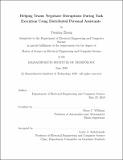Helping teams negotiate disruptions during task execution using distributed personal assistants
Author(s)
Zhang, Yuening,S.M.Massachusetts Institute of Technology.
Download1124762499-MIT.pdf (2.984Mb)
Other Contributors
Massachusetts Institute of Technology. Department of Electrical Engineering and Computer Science.
Advisor
Brian C. Williams.
Terms of use
Metadata
Show full item recordAbstract
People often collaborate on tasks, but they are also constantly overloaded. As humans, we find it particularly challenging when our local failures not only affect ourselves but also disrupt the smooth execution of the teams. This thesis provides a decision aid, d-Uhura, to help in these situations. d-Uhura is a set of computational assistants that help individuals adapt quickly to disruptions. Typically, automated systems resort to replanning when execution failures occur. However, replanning is too disruptive for human teams, and people often adapt to small failures by relaxing their requirements on the fly. By building upon Uhura, a personal assistant that helps users deal with plan over-subscription, d-Uhura can negotiate with its user to relax temporal constraints, such as deadlines, to quickly adapt to execution failures. However, Uhura is built for single users and does not consider their interaction with other individuals. d-Uhura fills the gap by assisting users not only in their personal life, but also in their negotiation within and across the teams. d-Uhura achieves this with three major innovations. First, we recognize that negotiation is difficult and costly under the collaborative context because disruptions can propagate to the teams and many other individuals in the teams. In real life, people often try to handle disruptions locally to avoid disturbing the teams. Drawing insight from human teams, d-Uhura takes a decompositional approach where the negotiation process is broken into individual-level negotiation and task-level negotiation, where each individual determines how he or she can relax the requirements given what the teams need, and each coordinator for the task makes sure the individuals' adaptations together still works for the team. As a result, individuals can engage the teams in negotiation on an as-needed basis, only if they are unable to adapt locally. Second, we identify that the key to enabling the above decomposition is to reduce the dependency between individuals during their execution so that they have the flexibility to adapt without affecting others. d-Uhura draws insight from temporal decoupling research to assist the individuals in reaching consensus on the temporal constraints under which each of them will act before execution. Third, privacy is often an essential requirement when we assist multiple people in their negotiation. d-Uhura is a distributed system, with one assistant for each individual, that also preserves the individual's privacy. d-Uhura contributed two schemes to preserve privacy for distributed algorithms for temporal decoupling and multi-agent negotiation, which is through conflict extraction and market-based optimization approach.
Description
This electronic version was submitted by the student author. The certified thesis is available in the Institute Archives and Special Collections. Thesis: S.M., Massachusetts Institute of Technology, Department of Electrical Engineering and Computer Science, 2019 Cataloged from student-submitted PDF version of thesis. Includes bibliographical references (pages 167-169).
Date issued
2019Department
Massachusetts Institute of Technology. Department of Electrical Engineering and Computer SciencePublisher
Massachusetts Institute of Technology
Keywords
Electrical Engineering and Computer Science.